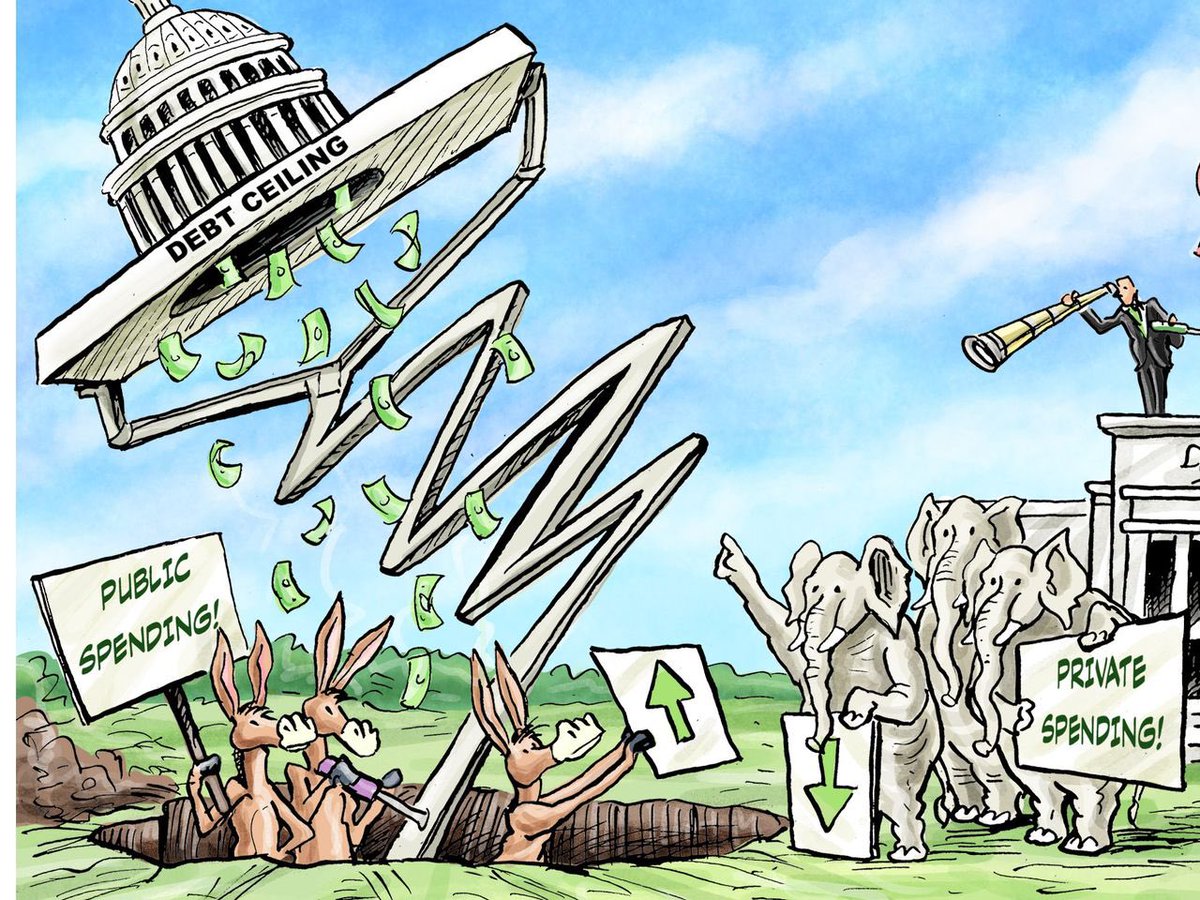1/13
📣 Thread on the recent debt ceiling deal between President Biden and Speaker Kevin McCarthy. The agreement brings new details to light. Do you agree or disagree with the deal? Here's a non-biased breakdown of the key components. 👇 #DebtCeiling #Biden #McCarthy
📣 Thread on the recent debt ceiling deal between President Biden and Speaker Kevin McCarthy. The agreement brings new details to light. Do you agree or disagree with the deal? Here's a non-biased breakdown of the key components. 👇 #DebtCeiling #Biden #McCarthy

2/13
The cornerstone of the agreement is a two-year suspension of the debt ceiling, allowing the government to continue borrowing and pay its bills on time, if Congress passes the agreement by June 5th. #DebtCeiling #Congress
The cornerstone of the agreement is a two-year suspension of the debt ceiling, allowing the government to continue borrowing and pay its bills on time, if Congress passes the agreement by June 5th. #DebtCeiling #Congress

3/13
In exchange for suspending the limit, Republicans demanded policy concessions from Mr. Biden, such as limits on federal discretionary spending growth and new work requirements for certain food stamps and Temporary Aid for Needy Families program recipients. #PolicyChanges
In exchange for suspending the limit, Republicans demanded policy concessions from Mr. Biden, such as limits on federal discretionary spending growth and new work requirements for certain food stamps and Temporary Aid for Needy Families program recipients. #PolicyChanges

4/13
The deal also includes modest efforts to accelerate energy project permitting, and surprisingly, a fast track to constructing a new natural gas pipeline from West Virginia to Virginia. #EnergyPolicy
The deal also includes modest efforts to accelerate energy project permitting, and surprisingly, a fast track to constructing a new natural gas pipeline from West Virginia to Virginia. #EnergyPolicy
5/13
The legislation cuts nondefense discretionary spending for the 2024 fiscal year, limiting discretionary spending growth to 1% in 2025, effectively a budget cut due to inflation. #Budget2024
The legislation cuts nondefense discretionary spending for the 2024 fiscal year, limiting discretionary spending growth to 1% in 2025, effectively a budget cut due to inflation. #Budget2024

6/13
The proposal, according to a @nytimes analysis, will reduce federal spending by about $55B next year, and another $81B in 2025. Over a decade, the savings could be about $860B. #FederalSpending
The proposal, according to a @nytimes analysis, will reduce federal spending by about $55B next year, and another $81B in 2025. Over a decade, the savings could be about $860B. #FederalSpending

7/13
The deal also targets I.R.S. funding, rescinding $1.38B immediately, and repurposing another $20B of the $80B given to the I.R.S. in last year's Inflation Reduction Act. #IRS
The deal also targets I.R.S. funding, rescinding $1.38B immediately, and repurposing another $20B of the $80B given to the I.R.S. in last year's Inflation Reduction Act. #IRS

8/13
There are new work requirements for older Americans (50-54) receiving food stamps and aid from the Temporary Assistance for Needy Families Program. Advocates for safety net assistance have expressed concerns about this. #FoodStamps #TANF
There are new work requirements for older Americans (50-54) receiving food stamps and aid from the Temporary Assistance for Needy Families Program. Advocates for safety net assistance have expressed concerns about this. #FoodStamps #TANF

9/13
Permitting reforms for energy projects are included, speeding up approvals, and the controversial Mountain Valley Pipeline project gets the green light. #EnergyPolicy #MountainValleyPipeline
Permitting reforms for energy projects are included, speeding up approvals, and the controversial Mountain Valley Pipeline project gets the green light. #EnergyPolicy #MountainValleyPipeline

10/13
The bill ends the student loan repayment freeze by August end and restricts Biden's ability to reinstate such a moratorium. It does not include a measure to halt Biden's student loan debt forgiveness policy. #StudentLoans
The bill ends the student loan repayment freeze by August end and restricts Biden's ability to reinstate such a moratorium. It does not include a measure to halt Biden's student loan debt forgiveness policy. #StudentLoans

11/13
The deal could prevent a government shutdown, as it sets parameters for the next two years of spending. However, major battles still loom in the specifics of those bills. #GovernmentShutdown
The deal could prevent a government shutdown, as it sets parameters for the next two years of spending. However, major battles still loom in the specifics of those bills. #GovernmentShutdown

12/13
There are, however, things that did not make it into the deal. Republicans wanted deeper spending cuts and stricter work requirements, as well as a repeal of certain tax incentives. None of these demands were met. #PolicyConcessions
There are, however, things that did not make it into the deal. Republicans wanted deeper spending cuts and stricter work requirements, as well as a repeal of certain tax incentives. None of these demands were met. #PolicyConcessions

13/13
That's the summary of the debt ceiling deal between Biden and McCarthy. With many stakeholders having their say, and some aspects of the agreement drawing criticism, it's vital for us to be informed. Do you agree or disagree with this deal? Reply with your thoughts.… twitter.com/i/web/status/1…
That's the summary of the debt ceiling deal between Biden and McCarthy. With many stakeholders having their say, and some aspects of the agreement drawing criticism, it's vital for us to be informed. Do you agree or disagree with this deal? Reply with your thoughts.… twitter.com/i/web/status/1…

🚨THE DEBT CEILING DEAL🚨 on Twitter Spaces tonight at 8:30pm EST 👇👇👇 twitter.com/i/spaces/1vAGR…
• • •
Missing some Tweet in this thread? You can try to
force a refresh

 Read on Twitter
Read on Twitter














